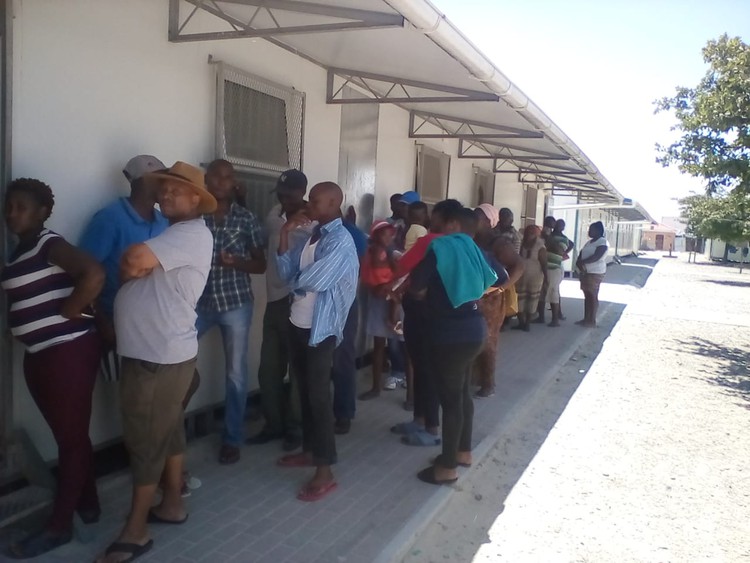
Mfuleni residents queued at Mfuleni Primary School to register for the May elections. But some have chosen not to register. Photo: Vincent Lali
28 January 2019
“I have never voted before and I don’t intend to do so now,” said Bathandwa Mbuqa, 28, as he sipped Castle Light at an illegal shebeen in Mfuleni at the weekend.
He said political leaders made promises but did not keep them.
“Politicians don’t deliver, so I don’t see why I must vote for them,” said Mbuqa.
He was one of several young people GroundUp interviewed who chose not to register this weekend.
Mbuqa said people still complained about lack of services in the same way they had done during apartheid.
“The quality of the houses we get is appalling. We still get second-rate education at schools and poor service at government hospitals and clinics,” said Mbuqa.
“Until people are satisfied with the way they are governed, I will not vote.”
Simphiwe Makhaye, 31, also decided not to vote. Makhaye says he has several diplomas but he cannot get a job. He is now learning to drive a bus.
“Leaders make promises and fail to make good on them. As a result, youths sit at home because they can’t find jobs.”
“I will not register to vote because voting is a waste of time,” he said, drinking a beer at Mzondi’s Tavern in Bardale.
But other Mfuleni residents queued at the registration office set up at the primary school.
“I want to have a say in who gets elected to run the country,” said Zolani Mekani, 44. “I expect the government to create jobs for people who have skills and build schools so that our kids can study and have a bright future.”
Sibusiso Mdeyide, 19, said he wanted to vote for a government which would make schools safe.
“We fear to venture outside the schoolyard because thugs rob us of our cell phones and cash. The government must deal with crime happening in and near schools,” he said.
“Also, I want government to give me money to further my studies to get a job after I have finished.”
Noluntu Ulana, who rents a backyard shack in Bardale for R450 a month, wants houses to be built for backyarders. Ulana said she used her children’s grants to pay the rent and occasionally worked as a shop assistant in Mfuleni.
She wants the new government to supplement social grant with food vouchers.
“The social grant runs out after I have bought my kids school uniforms and stationery, and we battle to get food,” said Ulana.
“I think the new government must add food vouchers to the social grant so that kids can have food after I have bought them school things.”
Simphiwe Ngwenduna, 40, said he wanted the government to increase police visibility in the townships and root out corruption.
“I hope government officials will introduce development projects and stop stealing taxpayers’ money,” he said.
Ngwenduma, who is a wheelchair user, said he battled to enter the registration station at Mfuleni Primary School on Saturday.
“My wheelchair could not go up the stairs. I ended up registering to vote outside because I was determined to use my right to vote,” he said.
“I want the new government to be more attentive to the needs of disabled and make all government buildings easily accessible to disabled people.”
Mandlakapheli Zenani, 48, said he wanted the government “to change the lives of ordinary people”. “But I’m not overly hopeful,” he said.
Zenani said he had battled to find a job all his life until he gave up and set up a meat business in Mfuleni.
“When I ask company bosses to give me a job, they say I’m too old. When I ask government officials to give me a pension, they say I’m too young,” he said.
“I have registered to vote so that I can vote for a party that I believe will create jobs for my kids after the elections.”
The Independent Electoral Commission said it would release the results of the registration weekend on Tuesday.